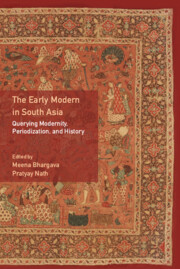4 - Contestations and Negotiations: Early Modern Individualism in Jain Heterodoxy, c. 1470–c. 1770
Published online by Cambridge University Press: 06 September 2022
Summary
While debating the ‘early modern’ in South Asian history, it is pertinent to acknowledge that the concept of ‘medieval’ is rooted in Orientalist discourse. Borrowed from Europe, the tripartite periodization has continued to loom large over the writing of South Asian history. In this chapter, however, I discuss the nature of early modernity in South Asia between the fifteenth and the seventeenth centuries in terms of some specific historical tendencies that characterized the history of Jainism. In terms of religious practices, Jainism witnessed the rise of individualistic consciousness and a new criticality during the period. In this context, I trace the formation of the individual as a category of analysis through the case study of two individuals from the Jain community. I further argue that the spirit of individualism, dialogue, debate, and dissent that characterized early modernity in Jainism in South Asia was derailed with the advent of colonial modernity.
Individualism and Early Modernity
There is a persisting uncertainty regarding the sites of differences and similarities with regard to medievalism and modernity across spaces; should one look into the material content of mundane life in order to locate patterns of common experiences, or in the world of ideas? European notions of modernity and their transplantation in the Asian context have ended up making tradition and modernity two opposite poles. However, both of these require to be seen in terms of interactions, more as overlapping circles than disconnected ones. As Franz-Josef Arlinghaus has argued, ‘… with respect to self-esteem, self-consciousness and (if at all) “autonomy” there are more similarities than differences between medieval and modern ways of being “individual”’. Engagement with the concept of the individual as a site that generates cultural narratives offers a good point of entry for constructing connected histories of ideas, knowledge, and cultural production. In the case of Europe, the window to modernity was largely opened by individuals since the time of the Renaissance. This is what emerges from the works of scholars like Carlo Ginzburg, Emmanuel Le Roy Ladurie, and Natalie Zemon Davis. Their ‘new histories’ reveal this by focusing on individual behaviour, choices, and experiences of characters like Menocchio and Martin Guerre. The individual has been one of the key categories through which the advent of modernity has been explained in recent times.
- Type
- Chapter
- Information
- The Early Modern in South AsiaQuerying Modernity, Periodization, and History, pp. 83 - 100Publisher: Cambridge University PressPrint publication year: 2023

